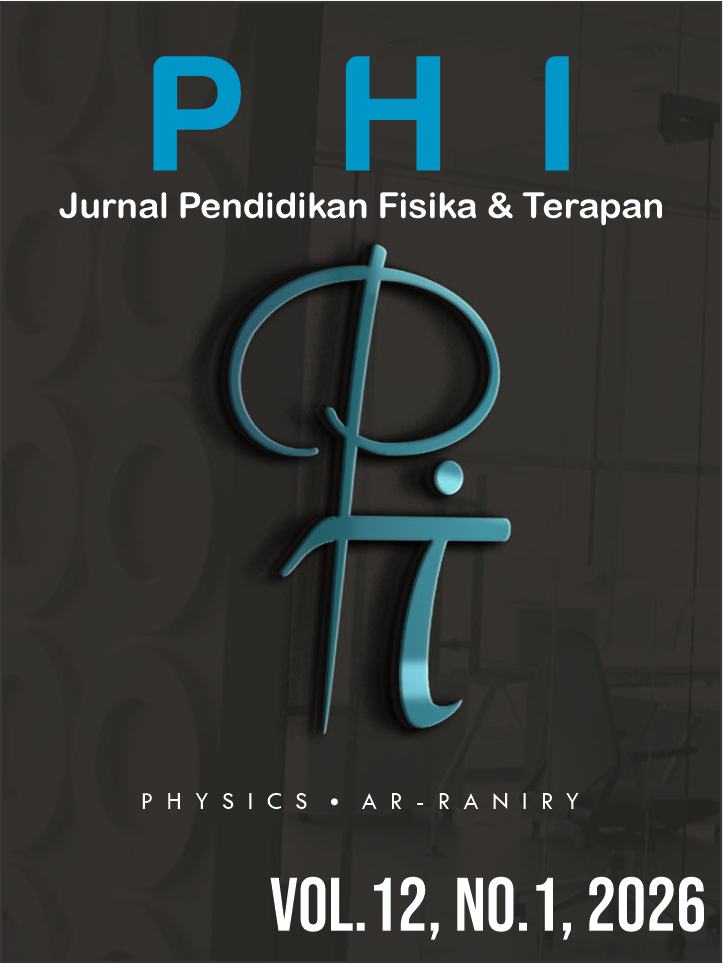The Effect of Deep Learning-Based Contextual Problem on Science Concept Understanding in Slow Learners at Inclusive Schools
DOI:
https://doi.org/10.22373/p-jpft.v12i1.31448Keywords:
Sciences, Contextual issues, Conceptual understanding, Deep learning, Inclusive schools, Slow learnersAbstract
Exploring deep learning in inclusive schools is urgent, as it plays a crucial role in fostering meaningful learning experiences for students with diverse abilities. This study aims to determine the effect of deep learning based contextual problem on science concept understanding among slow learners in inclusive schools. The research method used is a quasi-experimental design with a pretest-posttest control group design, involving two inclusive classes in the Yogyakarta region. One class served as the experimental group and received deep learning based contextual problem treatment for three weeks, while the control class received conventional instruction. The main instruments were multiple-choice tests to measure understanding of ecosystem concepts, as well as observation sheets of learning activities. The results of the analysis using the Mann-Whitney test showed a significant difference between the experimental and control groups (p = 0.000), indicating that this approach is effective in improving science concept understanding among slow learners. Learning was conducted through stages of understanding, application, and reflection, utilizing contextual media, field trips, and environmental management projects that involved the local community. These findings reinforce the relevance of constructivism, situated learning, and experiential learning theories in inclusive education. In addition to supporting cognitive aspects, this model also contributes to students' social skills and learning motivation. The practical implications of this study encourage teachers to apply adaptive and contextual learning strategies, as well as the importance of developing modules and teacher training.
References
Adytia, D., Saepudin, D., Pudjaprasetya, S. R., Husrin, S., & Sopaheluwakan, A. (2022). A deep learning approach for wave forecasting based on a spatially correlated wind feature, with a case study in the Java Sea, Indonesia. Fluids, 7(1), 39. https://doi.org/https://doi.org/10.3390/fluids7010039
Creswell, W. J., & Creswell, J. D. (2018). Research design: Qualitative, quantitative and mixed methods approaches. In Journal of Chemical Information and Modeling (Vol. 53, Issue 9).
Dewi, C. C. A., Erna, M., Haris, I., & Kundera, I. N. (2021). The effect of contextual collaborative learning based ethnoscience to increase student’s scientific literacy ability. Journal of Turkish Science Education, 18(3), 525–541. https://doi.org/https://doi.org/10.36681/
Farah, A., Agustiyawati, Rizki, A., Widiyanti, R., Wibowo, S., Tulalessy, C., Herawati, F., & Maryanti, T. (2022). Panduan pendidikan inklusif. In Kepala Pusat Kurikulum dan Pembelajaran Badan Standar, Kurikulum, dan Asesmen Pendidikan Kementerian Pendidikan Kementerian Pendidikan, Kebudayaan, Riset, dan Teknologi. Badan Standar, Kurikulum, dan Asesmen Pendidikan Kemendikbud RI. https://kurikulum.kemdikbud.go.id/wp-content/uploads/2022/08/Panduan-Pelaksanaan-Pendidikan-Inklusif.pdf
Farooq, M. S., & Aslam, S. (2020). Supporting slow learners’ in learning mathematics at primary school level. Journal of Elementary Education, 27(2), 99–114.
Hidayah, R., & Utami, R. D. (2024). The implementation of inclusive education programs in reading practice for low-grade slow learners in elementary schools. Jurnal Elementaria Edukasia, 7(3), 3144–3157. https://doi.org/https://doi.org/10.31949/jee.v7i3.9755
Kohli, A., Sharma, S., & Padhy, S. K. (2020). Specific learning disabilities: Issues that remain unanswered. Indian Journal of Psychological Medicine, 40(5), 399–405. https://doi.org/https://doi.org/10.4103/IJPSYM.IJPSYM_86_18
Obi, N. C., Cornelius-Ukpepi, & Ndifo, R. A. (2019). Constructivists’ theory and science education classroom. European Journal of Scientific Research, 154(4), 549–553.
Pratama, F. I. P., Kristiyanto, A., & Widyastono, H. (2021). Character values of third grade slow learner in character education at the inclusive elementary school. Jurnal Pendidikan Indonesia, 10(2), 345–352. https://doi.org/https://doi.org/10.23887/jpi-undiksha.v10i2.28838
Siry, C. (2020). Science education during times of crisis: calling for reflections, responses, and forward thinking from the CSSE community. Cultural Studies of Science Education, 15(2), 317–322. https://doi.org/10.1007/s11422-020-09985-5
Sukma, H. H. (2021). Pembelajaran slow learner di sekolah dasar. In Beginnings (American Holistic Nurses’ Association) (Vol. 16, Issue 1). K-Media. https://doi.org/10.2307/j.ctv6gqvxj.73
Suryanti, Widodo, W., & Budijastuti, W. (2020). Guided discovery problem-posing: An attempt to improve science process skills in elementary school. International Journal of Instruction, 13(3), 75–88. https://doi.org/10.29333/iji.2020.1336a
Suryawati, E., & Osman, K. (2018). Contextual learning: Innovative approach towards the development of students’ scientific attitude and natural science performance. Eurasia Journal of Mathematics, Science and Technology Education, 14(1), 61–76. https://doi.org/10.12973/ejmste/79329
Tambunan, A. R. S., Rachmadtullah, R., Nuraeni, Y., Samsudin, A., & Nurtanto, M. (2020). Teachers’ instructional interaction in an inclusive classroom: Interaction between general teacher and special assistant teacher. International Journal of Special Education, 35(1), 19–28. https://doi.org/https://doi.org/10.52291/ijse.2020.35.2
Tomasik, M. J., Helbling, L. A., & Moser, U. (2021). Educational gains of in‐person vs. distance learning in primary and secondary schools: A natural experiment during the COVID‐19 pandemic school closures in Switzerland. International Journal of Psychology, 56(4), 566–576. https://doi.org/https://doi.org/10.1002/ijop.12728
Wahyuni, N., Misykah, Z., & Panggabean, D. S. (2022). Teacher’s strategies in teaching slow learner students at elementary school. Jurnal Scientia, 11(1), 639–643.
Waite-Stupiansky, S. (2022). Jean Piaget’s constructivist theory of learning. In Theories of early childhood education (pp. 3–18). Routledge.
Waite, A. (2018). Examining Experiential Learning and Implications for Organizations. International Journal of Human Resource Development: Practice, Policy & Research, 3(1), 23–42. https://doi.org/10.22324/ijhrdppr.3.105
Widhanarto, G. P., Kusumawardani, S., Prihatin, T., & Prastyo, A. K. (2023). Enhancing early childhood learning experience with augmented reality modeling of animals and deep learning. Akademika, 12(2), 533–543. https://doi.org/https://doi.org/10.34005/akademika.v12i02.3128
Yıldız, T. (2025). From constructivism to cultural cognition: A comparative analysis of Piaget, Vygotsky, and Tomasello’S theories of cognitive development. HUMANITAS-Uluslararası Sosyal Bilimler Dergisi, 13(25), 411–429. https://doi.org/https://doi.org/10.20304/humanitas.1601228
Yulianto, H. (2024). An exploratory review of deep learning methods in education. Moderasi: Jurnal Studi Ilmu Pengetahuan Sosial, 5(2), 144–157. https://doi.org/https://doi.org/10.24239/moderasi.Vol5.Iss2.463
Yuwono, J., Aprilia, I. D., Suryana, D., & Fatimatuzzahra, A. (2021). Buku saku penyelenggaraan pendidikan inklusif di sekolah dasar. Direktorat Sekolah Dasar. http://ditpsd.kemdikbud.go.id/
Downloads
Published
Issue
Section
License
Copyright (c) 2025 Pradita Rizky Wirawan, Agnesi Sekarsari Putri

This work is licensed under a Creative Commons Attribution-NonCommercial 4.0 International License.
Authors who publish with Jurnal Phi agree to the following terms:
- Authors retain copyright and grant the journal right of first publication with the work simultaneously licensed under a Creative Commons Attribution License (CC BY 4.0) that allows others to share the work with an acknowledgment of the work's authorship and initial publication in this journal.
- Authors are able to enter into separate, additional contractual arrangements for the non-exclusive distribution of the journal's published version of the work (e.g., post it to an institutional repository or publish it in a book), with an acknowledgment of its initial publication in this journal.
- Authors are permitted and encouraged to post their work online (e.g., in institutional repositories or on their website) prior to and during the submission process, as it can lead to productive exchanges, as well as earlier and greater citation of published work (See The Effect of Open Access).

















